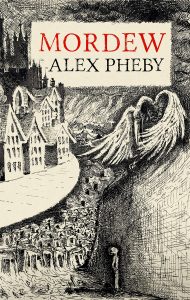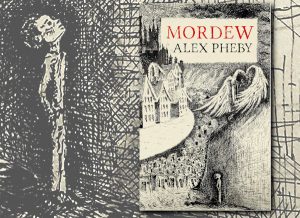MORDEW by Alex Pheby (Book Review)
“It is a misapprehension to imagine that only the reader reads. The book reads, too, when its pages are opened. Your souls spill words into the air, not only during speech.”
“’To be God, Nathan, is to be the Devil,’ he said, each word falling out of him like hatchlings from an abandoned nest. ‘Better to die, than to be God.’”
 There are books that from the moment you enter into their world, you know you are dealing with something special. Alex Pheby’s Mordew (2020) reminded me of what it was that drew me to the Fantasy genre in the first place, that feeling of reading Mervyn Peake’s Gormenghast novels (1946-1959) or M. John Harrison’s Viriconium stories (1971-1985), or China Mieville’s Bas Lag series (2000-2004). Here is Fantasy with a profound sense of the uncanny, Fantasy unafraid to embrace the grotesque and the strange, Fantasy that pushes at the edges of its metafictional relationship to the reader. Mordew is set in a world so strange and compelling that it is impossible not to believe in it. It is populated by characters outlandish and grotesque, and their commitment to surviving the bizarreness of the world they find themselves in makes them a joy to follow. And it is all tied together by Pheby’s glorious prose, which somehow manages to mix gothic descriptions with wry understatement to wonderful effect. Mordew is the first volume in a trilogy, and despite the fact that I am normally not good with series, I cannot wait for the next two books.
There are books that from the moment you enter into their world, you know you are dealing with something special. Alex Pheby’s Mordew (2020) reminded me of what it was that drew me to the Fantasy genre in the first place, that feeling of reading Mervyn Peake’s Gormenghast novels (1946-1959) or M. John Harrison’s Viriconium stories (1971-1985), or China Mieville’s Bas Lag series (2000-2004). Here is Fantasy with a profound sense of the uncanny, Fantasy unafraid to embrace the grotesque and the strange, Fantasy that pushes at the edges of its metafictional relationship to the reader. Mordew is set in a world so strange and compelling that it is impossible not to believe in it. It is populated by characters outlandish and grotesque, and their commitment to surviving the bizarreness of the world they find themselves in makes them a joy to follow. And it is all tied together by Pheby’s glorious prose, which somehow manages to mix gothic descriptions with wry understatement to wonderful effect. Mordew is the first volume in a trilogy, and despite the fact that I am normally not good with series, I cannot wait for the next two books.
Nathan Treeves lives in the slums of the magical city of Mordew, where he ekes out a meagre existence picking half-formed creatures from the Living Mud whilst his mother sells her body and his father dies of lungworm infection. However, Nathan has the power of the Spark, the magical properties of which propel him into adventure with the gangs of streetkids who perform daring robberies at the behest of the sinister Mr Padge, and draw him to the attention of the all-powerful Master of Mordew, who oversees every aspect of the city from his towering Manse. As his education of the city and the strange world he finds himself in continues, it becomes clear that Nathan’s power is something special and terrible that may even threaten the Master’s iron control of Mordew.
All this may look suspiciously like the standard chosen one set up we’ve seen in Fantasy so many times, and this suspicion is encouraged by the map of Mordew and the Dramatis Personae that open the book, and the extensive glossary at the end. But this is soon revealed as part of the extensive game of misdirection that Pheby is playing with this book. Mordew takes on the shape of traditional Fantasy narratives and tropes in order to play with and subvert the reader’s expectations. From the opening of the Dramatis Personae it is clear that something very strange is going on, the first character introduced being a talking dog, and character descriptions like this:
“He was born when a horse evacuated into a blacksmith’s forge: up went a billow of steam, and when the blacksmith looked down there was the Fetch, naked and red, and wrinkled like a rat cub.”
Rather than serving as a reminder of how the sprawling cast relate to the central narrative or a repository for worldbuilding not strictly necessary for the story, Pheby uses the Dramatis Personae and the Glossary as part of the novel’s unusual narrative structure. In particular, they are key in explicitly pointing out that the misogyny displayed by the Master and those under his power is a function of his fear and hatred of the Mistress of Malarkoi. Told in a dry, humorously pedantic voice reminiscent of Douglas Adams’ Hitchhiker’s Guide To The Galaxy entries, they must be read in order to complete the narrative. This is just a small example of the delightful and unexpected games Pheby plays with form and narrative throughout the book.
Mordew itself is a wonderful creation, and joins the ranks of Gormenghast, Viriconium and New Crobuzon as one of the great fantastical realisations of the urban uncanny. Built upon the corpse of murdered God, whose influence causes life grotesque and wonderful to spontaneously generate in the Living Mud of the slums, with a magical spiral glass road leading up to the Master’s Manse, the city is a glorious and dizzying work of imagination. Pheby has created a complex and engaging system of magic, theology and epistemology that ties into the plot in powerful and unexpected ways. However, Mordew isn’t just there to generate a sense of wonder in the reader. From the factories and warehouses to the slums that surround them and provide inexpensive labour, to the gin-houses and brothels up to the elegant environs enjoyed by the wealthy inhabitants of the Merchant City, Mordew is a living, breathing, functioning city with its own economies and class systems. The brutal realities of poverty and the exploitation of the working class by the merchant class are bare for all to see and not ameliorated in the slightest by Mordew’s fantastical setting.
Like the city itself, Mordew’s characters manage to be both larger than life and wonderfully believable. The gang Nathan joins is made up of the wonderfully brassy Prissy, the Artful Dodger-esque Gam Halliday, and Jerky Joes, two children who live superimposed on each other. The Master’s Manse is inhabited by various terrifying yet ultimately tragic characters, from the nightmarish gill-men to the Master’s factotum, Bellows, who with his massive blade-like nose is possessed of a magically enhanced sense of smell. The Master himself is sinister yet charming, as are his thoroughly likable mortal enemies, the Mistress of Malarkoi and her cunning daughter Dashini. Watching all these marvellous characters of varying degrees of grotesqueness running around trying to out-scheme each other is a joy in and of itself.
With its dizzying strangeness, nightmarishly surreal imagery and delightfully drawn characters, not to mention its playful attitude towards genre, metafiction and form, Mordew is a fantastically fun read. However none of this obscures the weighty themes that Pheby engages with, many of the subtleties of which are frequently ignored or elided in traditional Fantasy. From its brutally hierarchical structure, with the destitute poor frequently reduced to selling their children to the Master, Mordew is built on a system of power and subjugation. Nathan has suffered the worst excesses of this system, but as much as he aims to direct his growing magical power against the Master, he winds up being used as a weapon of destruction, wielded by the Master against the people of Malarkoi, who rather than being the faceless villains the Master portrays them as, are so run down and defeated they submit to their destruction at Nathan’s hands without a fight. Nathan’s ultimate rebellion against the Master brings down dramatic destruction, but the question of whether or not one can use the tools of the oppressor to do anything other than recreate the cycles of oppression remains open. Nathan is born into a system of violence and revenge, from the Master’s seizing of power to the murder of God, and his attempts to exercise his own agency are doomed to fall under the control of those who understand these systems better than he.
Pheby’s Mordew is an inventive, playful and thoroughly original take on Fantasy. Pheby’s previous novels sit outside the genre but have been nominated for the Wellcome Book Prize and won the Republic of Consciousness Prize. It is an utter delight that he has turned his hand to Fantasy, and I cannot wait to see what further strange and unsettling shapes he is able to twist his creation into as the trilogy continues.

